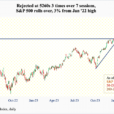It makes for quite the juxtaposition, though perhaps not so jarring given that global banks are still enormous and disparate operations. On the one hand, Citigroup’s CEO was eminently confident from within the confines of Davos and the status quo
:
The market is “adjusting” to a series of headwinds that can be overcome, Citigroup CEO Michael Corbat said Thursday, a day after theS&P 500 fell to its lowest level in nearly two years.
“We view what’s going on really as more a repricing than any big fundamental shift,” he told CNBC’s “Squawk Box” at the World Economic Forum in Davos, Switzerland.
The question is who is the “we” to which he is referring? It was just a year ago that no bank would even contemplate the possibility of recession entering Janet Yellen’s perfect year, especially as it was setup by “unquestionable” growth in the middle of 2014 (best jobs market in decades). This January, however, while Citi’s CEO downplays recent turmoil, the staff inside his very own bank is thinking very much otherwise:
The global economy is on the brink of a recession, with central bank stimulus less forthcoming and growth weakened by the slowdown in China, Citigroup warned on Thursday.
The bank cut its 2016 global growth forecast to 2.7 percent from 2.8 percent and slashed its outlook for the U.S., U.K. and Canada, plus several emerging markets including Russia, South Africa, Brazil and Mexico. [emphasis added]
That’s a lot of slashing in order to be so sanguine. I don’t agree with the premise, namely that this is all or even mostly due to China (the Chinese sell their industrial production to whom?), but the condition of the Chinese economy offers more universal interpretations upon these kinds of circumstances. That starts with the idea that China is slowing but within a more cheering transition to consumers rather than investment-led activity and margins. It is this idea that manufacturing and production matter, but not nearly as much as they used to and thus not enough to make a full recessionary difference right now.
After some minor encouragement in December, industrial factors in January have turned (yet again) to the depressively concerning. Today it was industrial profits.
Profits earned by Chinese industrial firms in December fell 4.7 percent from a year earlier, the seventh straight month of declines, as the slowing economy hits sales and forces many companies to cut prices to win business.
The weak performance is bound to spark fresh concerns about investment cuts, job losses and bad loans in the world’s second-largest economy, and could put more pressure on China’s stock markets, which have been pummelled [sic] to 14-month lows.












Leave A Comment